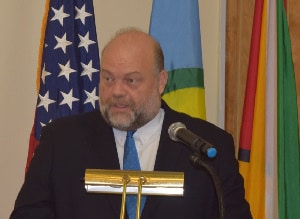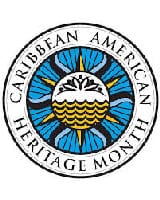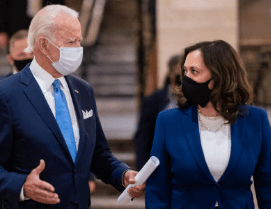Opinion: National Caribbean-American Heritage Month

By United States Ambassador Perry L. Holloway
WASHINGTON, DC – Caribbean-Americans have defined U.S. history. From distinguished leaders such as Colin Powell of Jamaican heritage and Shirley Chisholm of Bajan and Guyanese ancestry, to legends in the arts and sciences like Derek Walcott of St. Lucia and Dr. Patricia Bath of Trinbagonian lineage, descendants of the Caribbean have served at the helm of our nation and championed the United States’ most cherished ideals at home and abroad.
In 2006, President George W. Bush recognized the vast achievements of those of Caribbean heritage by declaring June National Caribbean-American Heritage Month. Since then, every U.S. president has honored our citizens of Caribbean descent with a similar proclamation. This year, President Trump stated, “As trailblazers, Americans with Caribbean roots have sewn their own unique thread into the fabric of our nation.”
The Caribbean-American community has also leveraged existing business, investment, and philanthropic relationships in service of both the United States and their countries of heritage. And so as we honor the achievements of Caribbean-Americans, we also recognize the sizable role our countries play in one another’s success.

As a testament to the U.S. commitment to the region, in December 2016 the U.S. Congress passed the United States – Caribbean Strategic Engagement Act (H.R. 4939), sponsored by Representatives Ileana Ros-Lehtinen (R-FL) and Eliot Engel (D-NY), with overwhelming bipartisan support. This law declared the broadening and deepening of U.S. engagement in the Caribbean as a key element of U.S. foreign policy in the region.
In accordance with the law, in June 2017, the Department of State released Caribbean 2020 – a living policy framework to bolster America’s partnerships in the Caribbean in six key areas: diplomacy, security, prosperity, energy, education, and health. It is available online and I encourage you all to take a look at it.
We have already begun to deliver on the commitments established in Caribbean 2020. In the last two years, senior U.S. officials have traveled frequently to the Caribbean to demonstrate U.S. support to the region. From former Secretary of State Tillerson’s meetings in Jamaica earlier this year to the Undersecretary for Political Affairs participating on the margins of the Caribbean Community (CARICOM) Heads of Government conference in Grenada, these high-level engagements underscore the U.S. commitment to enhancing our partnerships in the Caribbean.
On security, we are committed to the Caribbean Basin Security Initiative. Since its inception in 2010, the United States has appropriated almost $500 million to improve our mutual security, enhance maritime interdictions, reduce illicit trafficking, and mitigate underlying causes of crime to protect Caribbean families and communities.
In the area of prosperity, the United States prioritizes private sector engagement and sustainable growth. At the 2018 Caribbean Prosperity Roundtable in Miami, we brainstormed with Caribbean leaders and members of the private sector to come up with ways to spur economic development and job creation, and we are working at the OAS to bolster resiliency among small business operators in the economically vital Caribbean tourism sector.
In support of CARICOM’s 2027 goal to generate 47 percent of electricity from renewable sources, the Department of State and USAID provided $3.5 million in funding this fiscal year to support energy diversification in the Caribbean.
On education, we are building stronger partnerships between our higher education institutions and advancing cooperation on science and technology. As a part of this commitment, more than 11,000 exchange participants from the Caribbean have traveled to the United States on U.S. government-sponsored professional, cultural, sports, youth, and academic programs.
As we witnessed during the 2017 hurricane season, natural disasters know no borders. In the aftermath of two Category 5 hurricanes last year, the U.S. government provided more than $22 million in humanitarian assistance, including 185 metric tons of relief supplies, to support emergency relief efforts in Antigua and Barbuda, The Bahamas, Dominica, St. Kitts and Nevis, Saint Martin, and Saint Maarten. As another hurricane season gets underway, we continue to help countries in the Caribbean prepare for, respond to, and mitigate the impacts of natural disasters, and we stand ready to assist our friends should disaster strike.
We are also working together to address issues of regional concern. As neighbors and fellow citizens of the Americas and the Caribbean, we cannot ignore the dramatic deterioration of democracy in Venezuela, the suffering of the Venezuelan people, and the challenge posed to the region by the massive exodus of Venezuelans fleeing the crisis, including to the Caribbean. We thank the Caribbean community for standing with the Venezuelan people and continue to urge strong collective action to address the political, economic, and humanitarian crisis facing the people of Venezuela.
As we commemorate National Caribbean-American Heritage Month, we reaffirm our commitment to the Caribbean region and we look forward to pursuing a shared vision of a secure, prosperous, and democratic Western Hemisphere together with the people of Guyana and the rest of the Caribbean.



